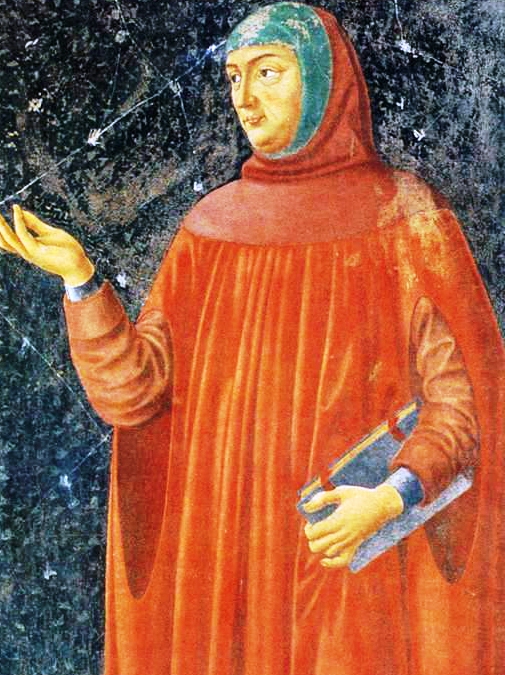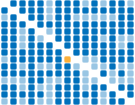The page of Petrarca, Francesco, English biography
Biography
Francesco Petrarca or Petrarch (July 20, 1304 – July 19, 1374) was an Italian scholar, poet, and early humanist. Petrarch and Dante are considered the fathers of the Renaissance.Petrarch was born in Arezzo the son of a notary, and spent his early childhood in the village of Incisa, near Florence. His father, Ser Petracco, had been exiled from Florence in 1302 (along with Dante) by the Black Guelphs. Petrarch spent much of his early life at Avignon and nearby Carpentras, where his family moved to follow Pope Clement V who moved there in 1309 to begin the Avignon Papacy. He studied at Montpelier (1316-20) and Bologna (1320-26), where his father insisted he study the law. However, Petrarch was primarily interested in writing and Latin literature.
When his father died in 1323, Petrarch returned to Avignon, where he worked in numerous different clerical offices. This work gave him much time to devote to his writing. With his first large scale work, Africa; an epic in Latin about the great Roman general Scipio Africanus; Petrarch emerged as a European celebrity. In 1341 he was crowned poet laureate in Rome, the first man since antiquity to be given this honor. He traveled widely in Europe and served as an ambassador. He was a prolific letter writer, and counted Giovanni Boccaccio among his notable friends. During his travels, he collected crumbling Latin manuscripts and was a prime mover in the recovery of knowledge from writers of Rome and Greece. Among other accomplishments, he commissioned the first Latin translation of Homer, and in 1345 he personally discovered a collection of Cicero's letters not previously known to have existed, the collection 'ad Atticum'. He remarked, "Each famous author of antiquity whom I recover places a new offence and another cause of dishonor to the charge of earlier generations, who, not satisfied with their own disgraceful barrenness, permitted the fruit of other minds, and the writings that their ancestors had produced by toil and application, to perish through insufferable neglect. Although they had nothing of their own to hand down to those who were to come after, they robbed posterity of its ancestral heritage." Disdaining what he believed to be the ignorance of the era in which he lived, Petrarch is credited with creating the concept of the Dark Ages which was later adopted, and greatly embellished, by subsequent writers.
On April 26, 1336 Petrarch claimed to have climbed, together with his brother and two servants, to the top of Mont Ventoux (1,909 m; 6,263 ft). He wrote a fictitious account of the trip, composed considerably later as a letter to his friend Francesco Dionigi. While this letter was an autobiographic reflection on his own life, later it has been falsely regarded as a report of an alpinistic expedition that actually existed. Therefore, April 26th, 1336 is regarded as the "birthday of alpinism", and Petrarch (Petrarca alpinista) as the "father of alpinism".
The latter part of his life he spent in journeying through northern Italy as an international scholar and poet-diplomat. Petrarch's career in the Church did not allow him to marry, but he did father two children by a woman or women unknown to posterity. A son, Giovanni, was born in Avignon in 1337 and a daughter, Francesca, was born in Vaucluse in 1343. Giovanni died of the plague in 1361. Francesca married Francescuolo da Brossano (who was later named executor of Petrarch's testament). In 1362, shortly after the birth of a daughter, Eletta, they joined Petrarch in Venice, to flee the plague then ravaging parts of Europe. A second grandchild, Francesco, was born in 1366, but died before his second birthday.
Petrarch settled about 1367 in Padua, where he passed his remaining years in religious contemplation. He died in Arquà in the Euganean Hills on July 19, 1374. He bequeathed his notable library of manuscripts to the city of Venice, where they form part of the nucleus of the Biblioteca Marciana.
source :: wikipedia




